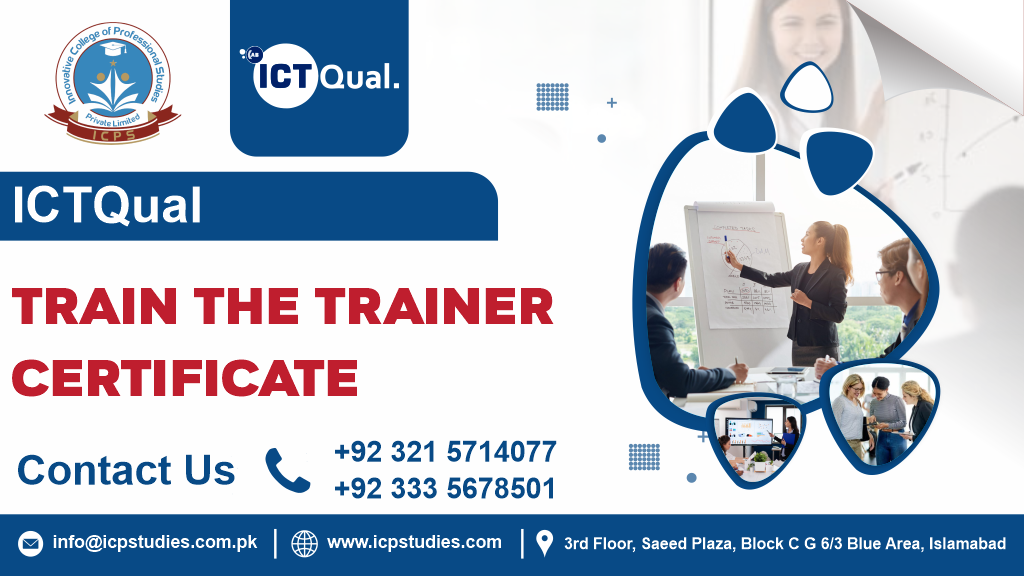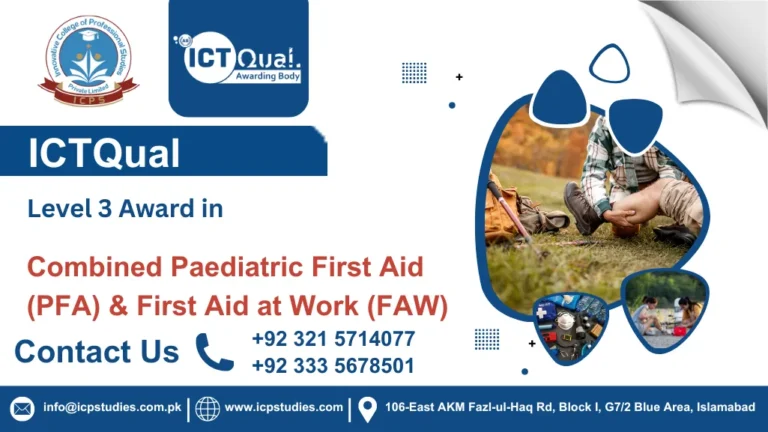In the dynamic landscape of education, the role of a teacher extends far beyond imparting knowledge. Today, educators are tasked with fostering engaging learning environments, embracing diverse teaching methodologies, and leveraging technology to enhance student outcomes. For those seeking to elevate their teaching skills and embark on a journey of professional development, a Train The Trainer Certificate stands as a beacon of empowerment.
A Train The Trainer Certificate is a specialized credential designed to equip educators with the skills, knowledge, and confidence to excel in their roles as trainers, facilitators, or instructors. This comprehensive program goes beyond traditional pedagogical training, focusing on the art and science of effective training delivery, adult learning principles, and instructional design strategies.
Train The Trainer Certificate is an investment in oneself and the future of education. Whether you’re a seasoned educator looking to refine your skills or a newcomer eager to make a mark in the field, this comprehensive program offers a pathway to empowerment, excellence, and endless possibilities in the world of teaching and training. Embark on your journey of transformation today and unlock the full potential of your teaching prowess with a Train The Trainer Certificate.
All About ICTQual Train The Trainer Certificate
Course Overview
A “Train The Trainer Certificate” is a professional credential designed to equip individuals with the skills, knowledge, and techniques necessary to effectively train others in a specific subject or field. This comprehensive training program typically focuses on developing proficiency in instructional design, facilitation, and training delivery methods.
Train The Trainer Certificate program equips individuals with the skills and confidence to excel as trainers, educators, or facilitators in various settings, including corporate training, professional development, vocational education, and community outreach programs. It empowers them to make a positive impact on the growth, development, and success of learners within their organizations or communities.
Study Units
- Getting Started
- Understanding Training and Facilitation
- Gathering Materials
- Creating a Lesson Plan
- Choosing Activities
- Preparing for the Workshop
- Getting Off on the Right Foot
- Delivery Tips and Tricks
- Keeping it Interactive
- Dealing With Difficult Participants
- Tackling Tough Topics
- Wrapping Up
Admission Criteria
Getting Started
- Understand the purpose and objectives of the training program.
- Identify the target audience and their learning needs.
- Familiarize oneself with the training environment and resources available.
2. Understanding Training and Facilitation
- Define the roles and responsibilities of a trainer/facilitator.
- Understand adult learning principles and their application in training.
- Recognize the importance of creating a positive learning environment.
3. Creating a Lesson Plan
- Develop clear and measurable learning objectives for the training session.
- Structure the lesson plan in a logical sequence to facilitate learning progression.
- Incorporate a variety of instructional methods and activities to engage participants.
4. Choosing Activities
- Select appropriate learning activities based on the learning objectives and participants’ preferences.
- Ensure that activities cater to different learning styles and preferences.
- Adapt activities to accommodate diverse group dynamics and learning needs.
5. Preparing for the Workshop
- Organize materials and resources required for the workshop.
- Rehearse the delivery of the workshop to ensure smooth execution.
- Anticipate potential challenges and prepare contingency plans.
6. Getting Off on the Right Foot
- Establish rapport and build trust with participants from the outset.
- Clarify workshop objectives, expectations, and ground rules.
- Create a welcoming and inclusive atmosphere conducive to learning.
7. Delivery Tips and Tricks
- Utilize effective communication techniques to convey information clearly and engagingly.
- Employ visual aids, multimedia, and props to enhance understanding and retention.
- Manage time effectively to cover all planned content while allowing for flexibility.
8. Keeping it Interactive
- Foster active participation and engagement among participants throughout the workshop.
- Facilitate group discussions, brainstorming sessions, and collaborative activities.
- Encourage reflection and peer learning opportunities.
9. Dealing With Difficult Participants
- Identify common challenges and disruptive behaviors in a training setting.
- Employ strategies for managing difficult participants and maintaining a positive learning environment.
- Address concerns and conflicts constructively while preserving the integrity of the workshop.
10. Tackling Tough Topics
- Approach sensitive or controversial topics with sensitivity and empathy.
- Foster open dialogue and respectful discourse among participants.
- Provide appropriate resources and support for individuals grappling with challenging subject matter.
11. Wrapping Up
- Review key concepts, insights, and takeaways from the workshop.
- Solicit feedback from participants to evaluate the effectiveness of the training.
- Provide resources for continued learning and support beyond the workshop.
Ideal Candidate
- Educational Qualifications:
- A minimum of a high school diploma or equivalent qualification is required.
- Some courses may have specific educational prerequisites, such as a bachelor’s degree or higher in a relevant field.
- Professional Experience:
- While not always mandatory, some courses may prefer applicants with prior experience in teaching, training, or facilitation roles.
- Relevant work experience in fields such as education, corporate training, human resources, or community development may be advantageous.
- Language Proficiency:
- Proficiency in the language of instruction is typically required. This may include proficiency in English or any other language specified by the course provider.
- Applicants may need to demonstrate their language proficiency through standardized tests or other recognized assessments.
- Technological Proficiency:
- Basic computer literacy skills are often necessary, as the course may involve online learning platforms, digital resources, and communication tools.
- Familiarity with common software applications and internet navigation is beneficial.
- Access to Resources:
- Access to necessary resources such as a computer with internet connectivity, relevant software applications, and study materials may be required.
- Some courses may specify additional resources or materials needed for participation.
- Interest and Motivation:
- Applicants should demonstrate a genuine interest in teaching, training, or facilitation and a commitment to professional development in this area.
- Strong motivation to learn and actively engage in the course activities is essential for success.
- Preparation for Workshop Participation:
- Applicants should be prepared to actively participate in workshop activities, which may involve group discussions, presentations, and practical exercises.
- Willingness to engage with diverse perspectives, collaborate with peers, and contribute constructively to the learning process is important.
- Compliance with Course Policies:
- Applicants must agree to comply with any course policies, including attendance requirements, academic integrity guidelines, and code of conduct.
- Applicants may need to provide consent for data processing and adhere to confidentiality agreements if applicable.
These entry requirements ensure that participants have the necessary foundation and readiness to benefit from the course content and actively contribute to a collaborative learning environment.
Learning Outcomes
This course is designed for individuals who are involved in or aspiring to be involved in the field of education, training, or facilitation. It is suitable for a wide range of participants, including:
- Educators and Teachers:
- Classroom teachers, lecturers, and instructors seeking to enhance their teaching skills and incorporate technology into their instructional practices.
- Trainers and Corporate Educators:
- Professionals involved in corporate training, staff development, or employee education who wish to improve their training delivery techniques and engage learners more effectively.
- Facilitators and Workshop Leaders:
- Individuals responsible for facilitating workshops, seminars, or group sessions in various settings, including community organizations, non-profits, and professional associations.
- Education Administrators and Leaders:
- School administrators, education managers, and department heads interested in understanding best practices in training and facilitation to support professional development initiatives within their institutions.
- HR and Learning and Development Professionals:
- Human resources professionals and learning and development specialists seeking to expand their skills in designing and delivering training programs for organizational development and employee growth.
- Community Educators and Advocates:
- Community educators, outreach workers, and social advocates involved in community-based education and capacity-building initiatives.
- Career Changers and Job Seekers:
- Individuals considering a career change into the field of education, training, or facilitation who wish to acquire foundational knowledge and skills in these areas.
- Students and Graduates:
- Undergraduate and graduate students studying education, instructional design, or related fields who want to supplement their academic learning with practical training in teaching and facilitation techniques.
This course is suitable for both novice educators looking to establish a strong foundation in teaching and training methodologies, as well as experienced professionals seeking to refine their skills and stay abreast of current trends and best practices in the field. It is designed to accommodate participants from diverse backgrounds and industries, fostering a collaborative learning environment where participants can exchange ideas, share experiences, and learn from one another.
FAQs about ICTQual Train The Trainer Certificate







